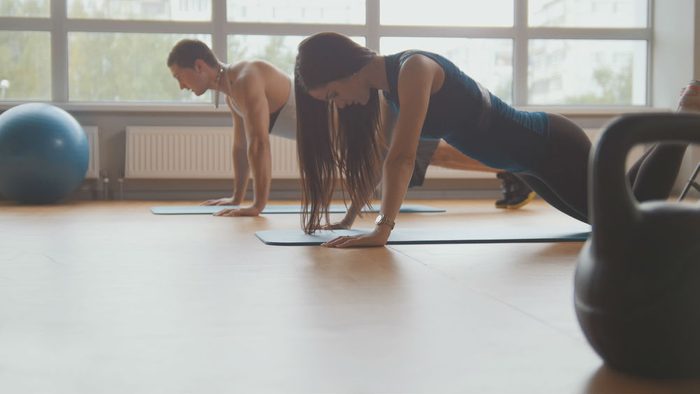
Should you give your workouts the cold shoulder during cold season?
You’ve likely heard the “from the neck up” rule. That’s the idea that if you’re experiencing cold symptoms in your neck and your face and head, you should be okay to exercise. But if it’s below the neck – say in your lungs or body aches – then you should skip it.
But exercising and colds have a more complicated than this simple breakdown. And that’s why we connected with celebrity trainer Brent Bishop and registered dietitian Michelle Latinsky about whether you should work out when you’re sick. Read on to find out how your workout sesh can affect your immune system, spots at your gym or fitness studio to avoid, what to eat and how much to drink, how to modify your workout if you’re sick and if you really should work out at all.
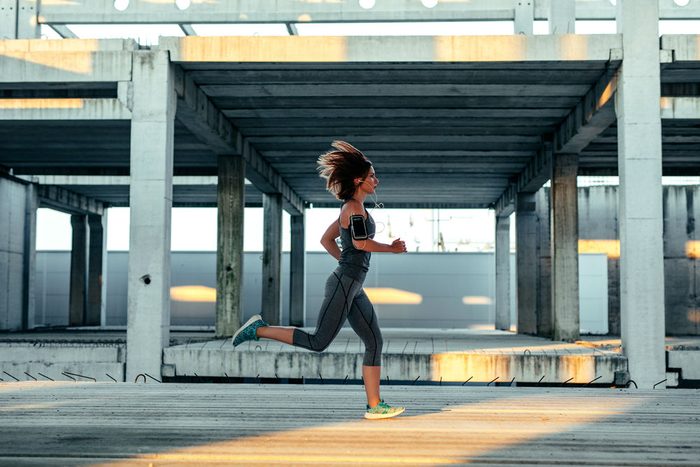
How exactly does physical activity affect the immune system?
Science says that exercise boosts the immune system over the long term. But it can also make you sick in the short term.
The fitness expert says: “Intense exercise temporarily lowers your immune system,” says Bishop. “That’s why almost all marathoners, for example, get sick a few days after running a race. And while you’re working out and training your body harder, it may increase the risk of higher free-radical formation and oxidative stress. While that all sounds negative, the good effects of exercise clearly outweigh the bad.” Bishop says a healthy lifestyle and diet balances and supports the immune system.
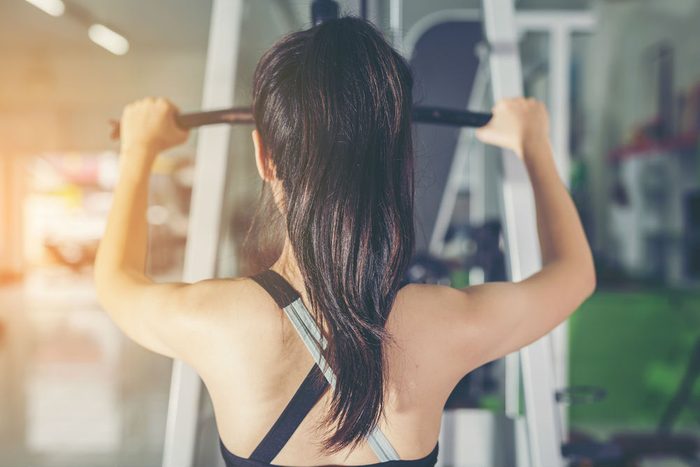
What areas in the gym should you avoid if you’re sick?
The gym is where people move and sweat. So, yes, it has germs. But you can prevent getting sick if you take Bishop’s advice.
The fitness expert says: “You may find more bacteria inside a gym than inside a public restroom,” he says. “That’s because you have multiple people touching the equipment. The most germy will typically be the weight machine handles and dumbbells. The least germy will likely be the benches because there’s a clothing layer between you and the equipment.”
So what can you do? “To minimize contact with germs, wipe down benches and cardio equipment before and after using them,” says Bishop. “Don’t touch your fingers to your eyes, nose or mouth. And it’s critical to wash your hands for 20 seconds before and after your workout.”
Here are 11 items we use every day that we don’t wash often enough.
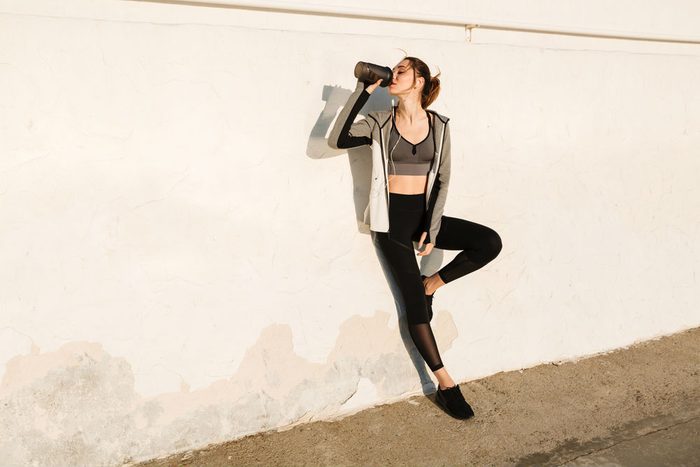
How can you boost immune system with your diet and hydration?
A recovery smoothie won’t be enough. You’ll need nutrients that will boost your workout recovery, as well as those nutrients that have been shown to help with immune support. While science seems to flip and flop whether vitamin C can prevent colds, meeting all your daily nutrient needs is the way to go. Same with drinking water.
The nutrition expert says: “Often, the supplements you’d take for workout recovery also help with sickness recovery,” says Latinsky, who is a spokesperson for Jamieson. “Amp up your vitamin C intake to the 1,000 to 2,000 milligram range each day, because vitamin C, as well as zinc and vitamin D, support a healthy immune system. Echinacea is great for enabling the body to fight off viral and bacterial invaders. Also consider ginger because, while we know it helps with nausea and upset stomach, it can also help naturally manage coughs.”
The fitness expert says: “Staying hydrated doesn’t have to mean just drinking more water,” says Bishop. “It may be easier to drink hot tea or chicken soup, especially if you are sick. Hot liquids may also help loosen congestion. Steam inhalation using a large bowl of hot water may also help. Some people like to add essential oils, such as eucalyptus, which has an antimicrobial effect. Also consider using a humidifier in the fall and winter, when the air starts to lose humidity.” And if you do work out with “neck up” symptoms, make sure you drink water – more than you would if you weren’t sick.
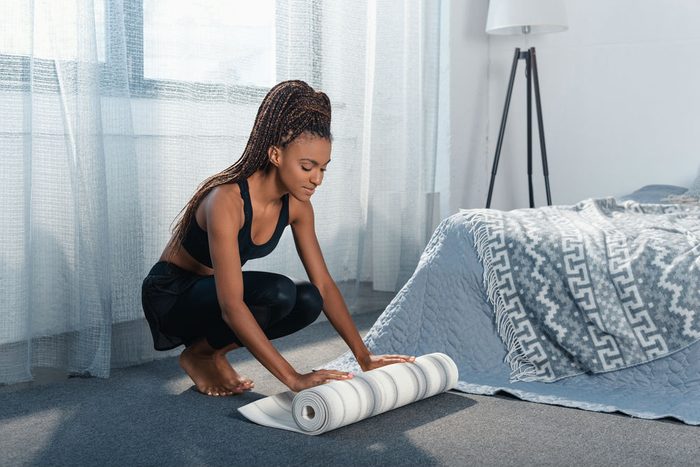
How can I stay fit if I have to avoid the gym?
Rest is super important if you are not well, and it might not be the best idea to work out when you’re sick. It helps you recover faster and, frankly, gives your body the rest it needs. But if you are up for it, you can modify your fitness routine .
The fitness expert says: If you’re sick but are well enough to do some movement, Bishop says: “You don’t need equipment to do push-ups, squats or lunges. Use common household items such as soup cans and detergent bottles for added weight. You won’t lose as much ground physically, and as a bonus, the activity will help clear your mind.”
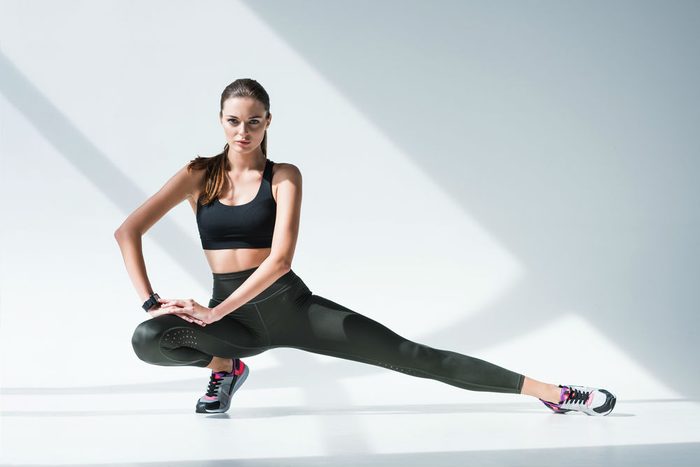
I feel sick. Should I work out?
Turns out, there is something behind that “neck” rule thing about whether you should work out when you’re sick.
The fitness expert says: “Some people use the sniffles as a reason not to exercise,” says Bishop. “But if your symptoms are above you neck, you can generally still work out, just with less intensity. As a matter of fact, it might even help you get better,” advises Bishop. “If your symptoms are in your chest, or you have a fever, you don’t want to further depress your immune system or increase your body temperature with intense exercise. It’s better to take a couple days off. It’s also about other people’s health as well as your own.”
However, if you do decide to work out, it is your responsibility to limit your germs from spreading. Exercise at home, or if you are healthy-ish enough to go the gym, carry the spray bottle with you and sanitize the equipment you touch. The others at the gym will thank you.
